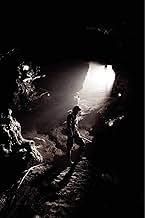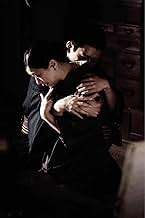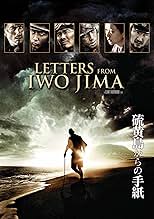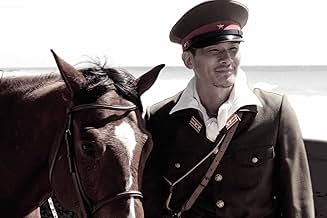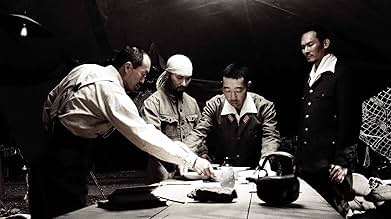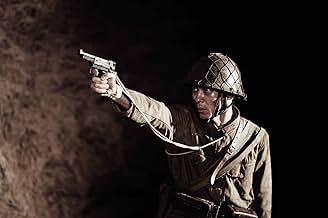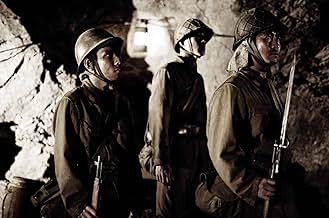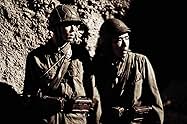The story of the battle of Iwo Jima between the United States and Imperial Japan during World War II, as told from the perspective of the Japanese who fought it.The story of the battle of Iwo Jima between the United States and Imperial Japan during World War II, as told from the perspective of the Japanese who fought it.The story of the battle of Iwo Jima between the United States and Imperial Japan during World War II, as told from the perspective of the Japanese who fought it.
- Won 1 Oscar
- 25 wins & 39 nominations total
Shidô Nakamura
- Lieutenant Itô
- (as Shidou Nakamura)
Luke Eberl
- Sam
- (as Lucas Elliot)
Sonny Saito
- Medic Endô
- (as Sonny Seiichi Saito)
Featured reviews
The companion film to "Flags of Our Fathers" shows the battle of Iwo Jima from the Japanese point of view. Starting with the building of fortifications, hiding from relentless bombardment, and fending off an equally strong attack as American troops land on the island.
"Letters from Iwo Jima" just like "Flags of Our Fathers" is a first rate war movie with a relevant message with its critical nature. "Flags" showed the selling of war and "Letters" does the same, albeit with a different mind-set. Japan was an empire governed by a monarch back then so the military mentality was quite different, but it is also important to note the similarities. Especially at the base of the social pyramid where it is quite apparent that people are people no matter where you go.
Virtually all of the uber-patriotic tendencies that were rampant in Imperial Japan during WWII were also in Nazi Germany and, as both "Flags" and "Letters" demonstrate in the United States as well. People were used for the purpose of the government and were fed propaganda just the same. Maybe a different in a different form, but in the end it is all the same.
Ken Wantanbe is the film's highlight as a military man torn between his sense of duty and his inner feelings. As commander of the island he sees amongst his men the fanaticism, the pacifism, the "just do our job" crowd, and many other configurations of thought in between and mixed with the others. Even strange that some men initially want to fight and are proud to serve in the military and what's shocking is that some of their wives and mothers believe the same.
That paints a landscape of war as something amidst all of the stereotypes that have been made of it. Since that is where the truth usually lies, amidst all the gray matter. --- 9/10
Rated R: war violence/carnage
"Letters from Iwo Jima" just like "Flags of Our Fathers" is a first rate war movie with a relevant message with its critical nature. "Flags" showed the selling of war and "Letters" does the same, albeit with a different mind-set. Japan was an empire governed by a monarch back then so the military mentality was quite different, but it is also important to note the similarities. Especially at the base of the social pyramid where it is quite apparent that people are people no matter where you go.
Virtually all of the uber-patriotic tendencies that were rampant in Imperial Japan during WWII were also in Nazi Germany and, as both "Flags" and "Letters" demonstrate in the United States as well. People were used for the purpose of the government and were fed propaganda just the same. Maybe a different in a different form, but in the end it is all the same.
Ken Wantanbe is the film's highlight as a military man torn between his sense of duty and his inner feelings. As commander of the island he sees amongst his men the fanaticism, the pacifism, the "just do our job" crowd, and many other configurations of thought in between and mixed with the others. Even strange that some men initially want to fight and are proud to serve in the military and what's shocking is that some of their wives and mothers believe the same.
That paints a landscape of war as something amidst all of the stereotypes that have been made of it. Since that is where the truth usually lies, amidst all the gray matter. --- 9/10
Rated R: war violence/carnage
10max-745
I have watched this film twice already this week (first week of release here in Japan). I am an American living in Japan for the past twenty two years and have yet to see such a strong performance from an (almost) all-Japanese cast. This movie draws you into the caves and makes you a part of the Japanese soldier's life. The main characters all have an interesting story to tell. But in the end the message is clear. War is futile.
The strangest part of all. Clint Eastwood has made a Japanese movie that the Japanese should have made. There is almost no way to tell it was a "foriegn" production until you see the credits.
The strangest part of all. Clint Eastwood has made a Japanese movie that the Japanese should have made. There is almost no way to tell it was a "foriegn" production until you see the credits.
Did it really last two and a half hours? It felt felt a lot shorter than that.
No, this is not an action war film with nonstop blood baths. It is a film that pulls the humanity out of the monster that is war.
This is one of, if not the best, movie ever directed by Clint Eastwood. I usually have a hard time following plots with many characters because they make me lose focus on the general story, but this one is done well. Not only am I engaged, I also become attached to every character and feel and understand their conflicts.
It does not matter who fights on the right or wrong side of WWII. This film goes beyond that. It is about what is right or wrong for the individual human being. It excels as a story about the human heart.
No, this is not an action war film with nonstop blood baths. It is a film that pulls the humanity out of the monster that is war.
This is one of, if not the best, movie ever directed by Clint Eastwood. I usually have a hard time following plots with many characters because they make me lose focus on the general story, but this one is done well. Not only am I engaged, I also become attached to every character and feel and understand their conflicts.
It does not matter who fights on the right or wrong side of WWII. This film goes beyond that. It is about what is right or wrong for the individual human being. It excels as a story about the human heart.
At the conclusion of the film a person behind me said, "Incredible," twice. Another person followed with, "A masterpiece." I would concur. Perhaps it isn't a perfect film but it is a movie with great impact. I find that it is a testament to the skill of Clint Eastwood as a director and Iris Yamashita as screenwriter that some of the scenes that had the greatest impact were of minor thingsa letter read out loud, the way someone saluted, a tear, a song...
There were no clear cut heroes or villains beyond "war" itself. I'm reminded of that saying, "No one wins a war. One side simply loses more than the other." War diminishes us all. We must learn to turn our backs on such endeavors even if it means that the military/industrial death merchants take a cut in profits or that they truly learn to hammer swords into plow shares.
If the film were to depict the battle in a manner that was realistically experienced by the soldiers the film would be unbearable to any viewer. One must see the battle and history as a kind of allegorical backdrop to a story about the utter inhumanity and futility of war. As a film it had to illustrate the overall societal insanity of war through a human lens, and it did this in a deeply moving way.
There were no clear cut heroes or villains beyond "war" itself. I'm reminded of that saying, "No one wins a war. One side simply loses more than the other." War diminishes us all. We must learn to turn our backs on such endeavors even if it means that the military/industrial death merchants take a cut in profits or that they truly learn to hammer swords into plow shares.
If the film were to depict the battle in a manner that was realistically experienced by the soldiers the film would be unbearable to any viewer. One must see the battle and history as a kind of allegorical backdrop to a story about the utter inhumanity and futility of war. As a film it had to illustrate the overall societal insanity of war through a human lens, and it did this in a deeply moving way.
I had previously watched the violent battle of Iwo Jima in two good movies: 1949 "Sands of Iwo Jima" and more recently in "Flags of Our Fathers". In both features, we see very well-choreographed battle scenes disclosed from the North American point of view, with the "heroism" of the American troops and the personal drama of a couple of soldiers and families, in the usual unilateral formula to reach great box offices in USA. Further, in these two movies, the enemy is nothing but evil and threatening one dimension shadows, using weapons to kill the brave marines.
However, "Letters from Iwo Jima" gives a totally different approach of war, unusual in Hollywood: it shows the human side of the enemies. In this film, the Japanese are also human beings, with different culture where they are prepared to die with honor, but people that love and are loved by someone, have families, wives and children, and fear and suffer with the insanities of war. In this aspect, I liked very much the pacifist perspective given by Clint Eastwood for the same battle, opening the eyes and hearts of viewers that probably were not able to understand this side of the Japanese (and other people) in a war. My vote is eight.
Title (Brazil): "Cartas de Iwo Jima" ("Letters From Iwo Jima")
However, "Letters from Iwo Jima" gives a totally different approach of war, unusual in Hollywood: it shows the human side of the enemies. In this film, the Japanese are also human beings, with different culture where they are prepared to die with honor, but people that love and are loved by someone, have families, wives and children, and fear and suffer with the insanities of war. In this aspect, I liked very much the pacifist perspective given by Clint Eastwood for the same battle, opening the eyes and hearts of viewers that probably were not able to understand this side of the Japanese (and other people) in a war. My vote is eight.
Title (Brazil): "Cartas de Iwo Jima" ("Letters From Iwo Jima")
Did you know
- TriviaShot back-to-back with Flags of Our Fathers (2006).
- GoofsThe world map seen in the Japanese command center on Iwo Jima does not demarcate the then British colony of Newfoundland, including it a part of Canada instead. Newfoundland did not join Canada until 1949.
- Quotes
General Tadamichi Kuribayashi: If our children can live safely for one more day it would be worth the one more day that we defend this island.
- SoundtracksString Quartet No.6, Op. 1-6, Hob. III-6, Mov.2
Composed by Joseph Haydn
At a party where Ken Watanabe participated
Details
- Release date
- Country of origin
- Official sites
- Languages
- Also known as
- Cartas desde Iwo Jima
- Filming locations
- Production companies
- See more company credits at IMDbPro
Box office
- Budget
- $19,000,000 (estimated)
- Gross US & Canada
- $13,756,082
- Opening weekend US & Canada
- $89,097
- Dec 24, 2006
- Gross worldwide
- $68,673,228
- Runtime
- 2h 21m(141 min)
- Color
- Sound mix
- Aspect ratio
- 2.39 : 1
Contribute to this page
Suggest an edit or add missing content







